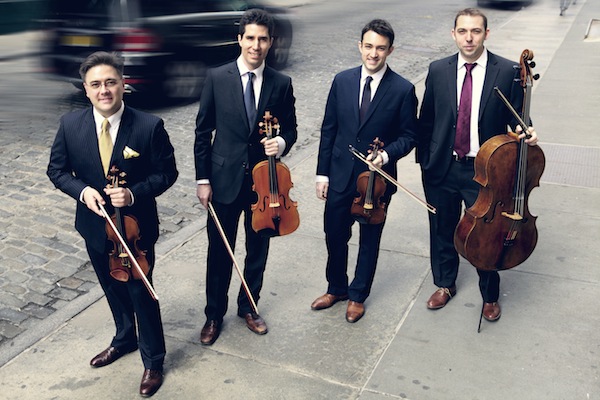Mendelssohn’s music shines anew with Chamber Music Society
The Chamber Music Society of Lincoln Center returned to Chicago Monday night for the middle program of their five-concert season, this time offering a Mainly Mendelssohn evening at the Harris Theater.
The Escher String Quartet was in the spotlight on the first half. The New York-based ensemble displayed admirable musicianship in Schubert’s Quartettsatz, which led off the evening.
This nine-minute fragment is a road marker on Schubert’s rocky journey to his late quartets. The composer left this single movement as a fragment of an uncompleted work as he struggled to reconcile his increasingly complex musical thoughts within the quartet form.
The Escher musicians’ playing was polished and responsive throughout. They underlined the jumpy agitation of the Allegro assai motif, with the brisk tempo for the lyrical second theme keeping any Biedermeier sentimentality at bay.
The pure timbre of first violinist Adam Barnett-Hart reflects the Escher corporate sound as a whole: lithe, slender and elegant, which would seem ideal qualities for Mendelssohn’s String Quartet in E minor, Op. 44, no. 2.
This most played of the composer’s string quartets is his first wholly characteristic work in the form, and here too the Escher Quartet’s trim agility and refined tone consistently fell easily on the ears.
Still, one wanted a greater variety of dynamics and hues, with the Escher’s literal take on the Scherzo more dogged than charming. Too often the playing centered on a kind of bland efficiency with the soft-focus, homogeneous sonority suggesting an invisible gauze curtain between the players and the audience.
Just when one became convinced that the Harris acoustic was to blame, the masterful, personality-plus performance of Mendelssohn’s Piano Trio No. in D minor after intermission decisively proved that not to be the case.
With two musical veterans–pianist Jeffrey Kahane and cellist David Finckel–joined by their younger colleague, violinist Arnaud Sussmann, it was clear that we were in a different universe of Mendelssohn performance entirely. The playing was no less refined or polished than on the first half, but there was a bolder projection, greater vitality, and wonderfully communicative, even joyous, swing to the playing.
Like all first-class performances, the playing of the Op. 49 Trio made one wonder anew at this remarkable work. Mendelssohn’s winning score is charismatic yet never merely facile, a virtual showcase for his fleet vitality, profusion of melody, and seamless craft.
Kahane’s supple virtuosity and the warm yet contrasted string timbres of Sussmann and Finckel were impeccably balanced throughout with the cellist’s piquant playing especially delightful.
All three musicians luxuriated in the Andante’s “Song Without Words”-like lyrical expansiveness. Their scintillating take on the Scherzo conveyed the elfin leggierissimo charm, with witty final pizzicatos. The performance deftly alternated the finale’s insistent main theme with the contrasting lyrical melody, ratcheting up the tension and excitement with a burst of exhilarating bravura at the coda.
Jeffrey Kahane is making a neat career of conducting Mozart concertos from the keyboard–an attractive proposition these days for music organizations looking to save a conductor fee.
That’s not to slight Kahane’s Mozartean bona fides, as shown in his performance of the Adagio in B minor, which preceded the Mendelssohn trio. Others may explore this late work’s desolation more deeply, but Kahane’s direct rendering conveyed the searching, melancholy-tinged expression with clear-eyed sensitivity.
The Chamber Music Society of Lincoln Center next performs 7:30 p.m. March 8. The program includes Franck’s Sonata in A major (arranged for cello and piano), Mendelssohn’s Piano Trio No. 2 in C minor and Ravel’s Cinq mélodies populaires grecques. harristheaterchicago.org
Posted in Performances





